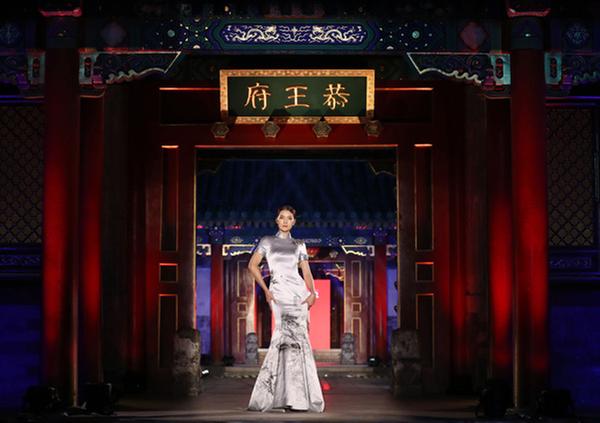From imitation to innovation: China's fashion industry gets tech boost
Xinhua | Updated: 2017-06-12 09:54
 |
| A model shows a wedding dress at a fashion show held at the Prince Gong Mansion, the largest and best-preserved Qing Dynasty (1644-1911) princely mansion in Beijing, on June 10, 2017. [Photo/Xinhua] |
BEIJING - For Chinese fashionistas, a new party dress can be a huge purchase, but the Internet is making it easier to dress sharp without a big price tag or long-term commitment.
Dora's Dream, a women's clothing start-up, runs a subscription-based service that allows style-conscious Chinese to borrow designer clothes with just a small monthly payment.
The clothes-sharing service generated buzz last week at the 2017 Asia Fashion Federation China Conference held in Hangzhou in East China's Zhejiang Province, where fashion designers from Asia gathered to discuss the latest industry trends.
One of those trends, said Chen Dapeng, vice director of China National Textile and Apparel Council, was the integration of the online and fashion industries in China.
"The Internet has enabled consumers to have their own definitions of 'fashion' and allowed them to participate in design," Chen said. "Fashion is becoming more and more personalized."
As Chinese manufacturers try to move up the value chain as part of the country's "Made in China 2025" plan, designers in China are working to reinvent themselves from mere imitators to innovators.
Unlike in France or Italy, China's fashion industry took off around the same time as the development of the Internet, which made it easier for industry insiders to have an "Internet mindset" and computer skills, experts said.
According to Chen, technology will help fashion designers with tailored marketing and flexible production, making personalized customer experiences possible.
Designers in China are also experimenting with a mix of design and lifestyle by opening spaces that offer coffee, books, exhibitions, and clothes.
"Instead of just selling products or services, Chinese fashion companies are now also selling culture," said Zhang Qinghui, president of the China Fashion Association.
According to Zhang, China's strong manufacturing power has laid a solid foundation for the development of the fashion industry, allowing ideas to be executed and products to be sold more efficiently.
"Almost every fashion center in the world has advanced manufacturing capability and support resources," Zhang said.
"While it seems that fashion is a showcase of design capability, it also represents the manufacturing power of a country," he said.
Adding to the optimism for a boom in the industry is China's shift in consumption, as an increasing number of shoppers crave high-quality products with great design.
"The Chinese consumer market is promising, not only because of its volume, but also because local consumers are very reactive, enthusiastic about new things and sensitive to brands and quality," said Andrea Boragno, CEO and chairman of Alcantara, which makes a leather substitute used in fashion and accessories, automotive interiors and consumer electronics.
According to Boragno, Chinese designers have made strides in recent years by shifting from copying to developing their own identities based on creativity and culture.
More than 200 colleges and universities in China now offer design-related majors, preparing fashion aficionados for jobs in the industry.
The industry has also attracted talented designers who have returned from studying and working abroad, including those who have worked for world-renowned luxury brands such as Celine and Burberry.
"As China joins the global 'fashion family,' the industry can take advantage of more resources worldwide," Zhang said.
























